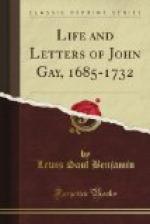“The enclosed[10] will discover that I did not make use of every argument with which you had furnished me; but I had a reason, of which I am not at this time disposed to make you a judge. Conquest is the last thing a woman cares to resign; but I should be very sorry to have you in the desperate state of my Knight-errant. No! I would spare you, out of self-interest, to secure to me those I have made by your assistance.”
THE HON. MRS. HOWARD TO JOHN GAY.
August 22nd [1723].
“I am very much pleased to find you are of my opinion. I have always thought that the man who will be nothing but a man of wit oftener disobliges than entertains the company. There is nothing tries our patience more than that person who arrogantly is ever showing his superiority over the company he is engaged in. He and his fate I think very like the woman whose whole ambition is only to be handsome. She is in continual care about her own charms and neglects the world; and he is always endeavouring to be more witty than all the world, which makes them both disagreeable companions.
“The warmth with which I attack wit will, I am afraid, be thought to proceed from the same motive which makes the old and ugly attack the young and handsome; but if you examine well all those of the character I have mentioned you will find they are generally but pretenders to either wit or beauty, and in justification of myself I can say, and that with great sincerity, I respect wit with judgment, and beauty with humility, whenever I meet it.
“I have sent the enclosed[11] and desire an answer. I make no more apologies, for I take you to be in earnest; but if you can talk of sincerity without having it, I am glad it is in my power to punish you, for sincerity is not only the favourite expression of my knight-errant, but it is my darling virtue.
“If I agree with you, that wit is very seldom to be found in sincerity, it is because I think neither wit nor sincerity is often found; but daily experience shows us it is want of wit, and not too much, makes people insincere.”
[Footnote 1: Paul Methuen (1672-1757), diplomatist; Comptroller of the Household 1720-1725; K.B., 1725.]
[Footnote 2: Lives of the Poets (ed. Hill), III, p. 273.]
[Footnote 3: B.M., Add. MSS., 28275, f. 8.]
[Footnote 4: Swift: Works (ed. Scott), XVI, p. 385.]
[Footnote 5: George William, born November 2nd, 1717, died February 6th, 1722.]
[Footnote 6: Works (ed. Elwin and Courthope), VII, p. 422.]
[Footnote 7: Swift: Works (ed. Scott), XVI, 390.]
[Footnote 8: Swift: Works (ed. Scott), XVI, p. 398.]
[Footnote 9: Swift: Works (ed. Scott), XVI, p. 297.]
[Footnote 10: Probably a letter from Lord Peterborough to Mrs. Howard.]




